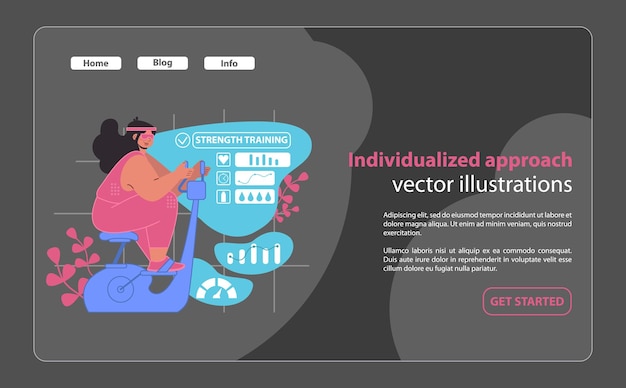FDA Approves Digital Therapeutic for Depression: Is it Right for You?

The FDA recently approved a new digital therapeutic for depression, offering a novel approach to mental health treatment through technology, raising questions about its efficacy, accessibility, and suitability for different individuals.
The FDA’s recent approval of a digital therapeutic for depression marks a significant step in integrating technology into mental healthcare. But what does this mean for individuals seeking help, and is this new approach right for you? Let’s dive into the details of recent updates: FDA approves new digital therapeutic for depression – is it right for you?
Understanding Digital Therapeutics for Depression
Digital therapeutics (DTx) are evidence-based software programs designed to prevent, manage, or treat a medical disorder or disease. In the context of mental health, these tools often deliver cognitive behavioral therapy (CBT) techniques, mindfulness exercises, or other therapeutic interventions via smartphones, tablets, or computers.
How Do Digital Therapeutics Work?
Digital therapeutics work by actively engaging the user and facilitating behavioral changes through personalized interventions. They often incorporate gamification, progress tracking, and reminders to enhance engagement and adherence. The goal is to provide accessible, convenient, and effective mental health support.
Benefits of Digital Therapeutics
Digital therapeutics offer several potential advantages over traditional treatments. They can be more accessible, especially for individuals in remote areas or those with mobility issues. They can also be more affordable and convenient, allowing users to engage with therapy at their own pace and on their own schedule.
- Accessibility: DTx can reach individuals who may not have access to traditional mental healthcare services.
- Convenience: Users can engage with therapy at any time and from anywhere.
- Affordability: DTx may be more cost-effective than traditional therapy sessions.

The rise of digital therapeutics represents a significant shift in how we approach mental healthcare, offering new avenues for treatment and support that complement traditional methods.
The Newly Approved DTx: What You Need to Know
The specific digital therapeutic recently approved by the FDA is designed to treat depression by delivering tailored interventions based on cognitive behavioral therapy principles. It aims to help individuals identify and modify negative thought patterns and behaviors that contribute to their depression.
Key Features and Functionalities
This DTx typically offers interactive lessons, mood tracking tools, relaxation exercises, and personalized feedback. It may also include features such as goal setting, progress monitoring, and access to a peer support community.
Clinical Evidence and Efficacy
The FDA approval of this digital therapeutic is based on clinical trials demonstrating its safety and efficacy. These trials typically involve comparing the DTx to a control group or a standard treatment, with outcomes measured using validated depression scales.
How to Access and Use the DTx
Accessing the DTx often requires a prescription from a healthcare provider. Once prescribed, users can download the app or access the program online. The DTx typically provides onboarding instructions and ongoing support to help users get the most out of the program.
Understanding the features, evidence, and accessibility of the newly approved DTx is crucial for making informed decisions about your mental healthcare journey.
Is a Digital Therapeutic Right for You?
Deciding whether a digital therapeutic is the right choice for your depression involves considering several factors, including the severity of your symptoms, your preferences for treatment, and your comfort level with technology. It is best to consult with your healthcare provider to make the best care decision for you.
Consider Your Symptoms and Needs
Digital therapeutics may be most effective for individuals with mild to moderate depression. People with severe depression or those who require more intensive support may benefit more from traditional therapy or medication.
Evaluate Your Comfort with Technology
DTx requires a certain level of technological literacy and comfort. If you struggle with using smartphones, tablets, or computers, digital therapeutics may not be the best fit for you.
Discuss with Your Healthcare Provider
It is essential to discuss your interest in digital therapeutics with your doctor or mental health professional. They can assess your needs, provide guidance, and help you determine if a DTx is appropriate for your situation.
- Severity of Symptoms: DTx may be more suitable for mild to moderate depression.
- Technological Comfort: Users should be comfortable using digital devices and apps.
- Professional Guidance: Consult with your healthcare provider to make an informed decision.
Choosing the right treatment approach is a personalized decision, and digital therapeutics are just one option among many available for managing depression.

Potential Benefits and Drawbacks
Like any treatment approach, digital therapeutics have both potential benefits and drawbacks. Understanding these pros and cons can help you make a more informed decision about whether to try a DTx.
Advantages of Digital Therapeutics
One of the primary benefits of DTx is their accessibility. They can be used anytime, anywhere, eliminating the need for in-person appointments. This can be particularly advantageous for individuals with busy schedules or limited access to mental healthcare providers.
Disadvantages of Digital Therapeutics
One potential drawback is the lack of face-to-face interaction, which some individuals may find essential for effective therapy. Additionally, DTx may not be suitable for individuals with severe mental health issues that require more personalized and intensive care.
Cost and Insurance Coverage
The cost of digital therapeutics can vary. Some DTx may be covered by insurance, while others may be available through employer-sponsored programs or direct purchase. It’s important to check with your insurance provider to understand your coverage options.
Balancing the advantages and disadvantages of digital therapeutics is critical in determining whether they align with your individual needs and preferences.
Incorporating DTx into Your Treatment Plan
If you and your healthcare provider decide that a digital therapeutic is a good fit for you, the next step is to incorporate it into your overall treatment plan. This may involve using the DTx as a standalone treatment or in combination with other therapies or medications.
Using DTx as a Complementary Treatment
Many individuals find success using DTx to supplement traditional therapy sessions. The DTx can provide additional support and practice in between appointments, reinforcing the skills and strategies learned in therapy.
Combining DTx with Medication
DTx can also be used in conjunction with antidepressant medication. The DTx can help manage symptoms and improve overall well-being, while medication can address the underlying chemical imbalances in the brain.
Setting Realistic Goals and Expectations
It is important to set realistic goals and expectations when using a digital therapeutic. DTx is not a quick fix, and it requires consistent effort and engagement to see results. Over time symptoms can improve by using this tool.
Integrating digital therapeutics into your treatment plan should be a collaborative process between you and your healthcare provider, ensuring that it aligns with your overall mental health goals.
The Future of Digital Therapeutics in Mental Health
The future of digital therapeutics in mental health is promising, with ongoing advancements in technology and a growing body of evidence supporting their effectiveness. DTx are poised to play an increasingly important role in the delivery of mental healthcare.
Advancements in Technology
As technology continues to evolve, digital therapeutics are becoming more sophisticated and personalized. Artificial intelligence (AI) and machine learning are being used to tailor interventions to individual needs and preferences, enhancing engagement and outcomes.
Increased Accessibility and Integration
DTx is becoming more accessible and integrated into mainstream healthcare. As more healthcare providers and insurance companies recognize the value of DTx, they are becoming more widely available to individuals seeking mental health support.
Potential Challenges and Concerns
Despite the potential benefits, challenges and concerns remain. Ensuring user privacy and data security, addressing the digital divide, and maintaining quality control are essential issues that need to be addressed as the field of digital therapeutics continues to grow.
The ongoing development and refinement of digital therapeutics hold great promise for improving mental healthcare accessibility, affordability, and effectiveness in the years to come.
| Key Point | Brief Description |
|---|---|
| 📱 Digital Therapeutics | Evidence-based software to manage or treat medical disorders. |
| ✅ FDA Approval | DTx approved based on clinical trials showing safety and efficacy. |
| 💡 Benefits | Accessibility, convenience, and affordability compared to traditional therapy. |
| ⚕️ Consultation | Discuss with your healthcare provider to see if DTx is right for you. |
Frequently Asked Questions
▼
Digital therapeutics are evidence-based software programs designed to treat medical conditions. They use technologies like apps and wearable sensors to deliver interventions. They aim to provide treatment options. They are often used for mental health issues.
▼
DTx for depression often uses cognitive behavioral therapy (CBT) techniques and mindfulness exercises through a smartphone or other digital device. It is designed to help the user. The goal is to change the users thinking patterns.
▼
Insurance coverage for digital therapeutics can vary but it is slowly improving. It is important to check with your insurance provider to determine coverage for any specific digital therapeutic your doctor has prescribed. Check current coverage rates.
▼
One of the major benefits is accessibility, which makes reaching those in rural areas faster for treatment. It is a lower cost treatment option compared to in house sessions. It also brings a lot of convenience for the user.
▼
Yes, digital therapeutics are often used in conjunction with traditional therapy. Be sure to combine traditional therapy with a digital therapeutic. Ask your doctor which direction to go based on your needs. They can also both be done separately.
Conclusion
The FDA’s approval of a digital therapeutic for depression opens up new possibilities for mental health treatment, offering convenience and accessibility. While not a one-size-fits-all solution, it presents a valuable option, especially when integrated thoughtfully into a comprehensive treatment plan under the guidance of a healthcare professional.